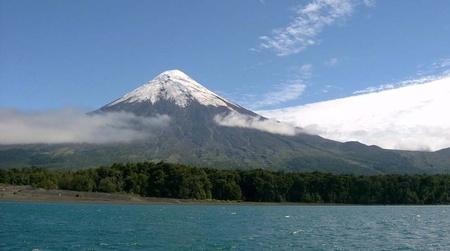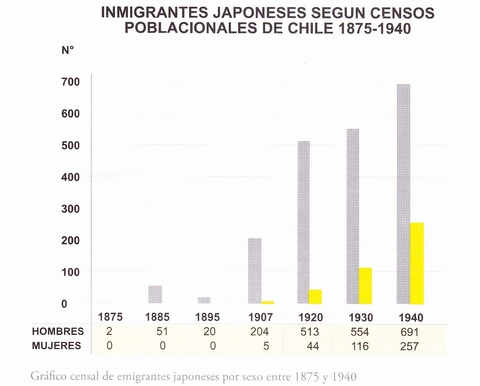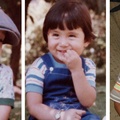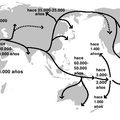CONSEQUENCES DERIVED FROM THESE CAUSES
- In Chile there is no Japanese Colony due to the persistent campaign carried out by the power groups of the last century to avoid the danger of the internal presence of a Japanese group that, through excessive work, could appropriate its many lands, due to its "multiplication in geometric progression” and for its historical group danger.
- The difficulty of finding a job according to their abilities and merits due to the “closed door” policies that shamelessly favored the white immigrant (even over the locals themselves), as well as due to the level of underdevelopment in which the country was located. This situation forced the Japanese to earn a living in independent occupations with minimal costs (hairdressing, for example), resorting to small businesses and other basic occupations. Therefore, this Japanese located his home in the popular neighborhoods. (This Japanese had a minimum of secondary education or higher level professional qualifications, while Chilean illiteracy exceeded 50%. Likewise, his cultural level far exceeded that of the white immigrant).
- The presence in Chile of only solitary Japanese, their low number, the lack of recognition given by the Chilean or Japanese governments and the precariousness of their unstable occupations... in addition to their communications difficulties; It forced them to disperse geographically in search of some stability. This distancing from each other meant that when they formed a family they related only to their immediate neighborhood without having close peers with whom to share their children's initiation into Japanese culture. Reversing this situation was now impossible...as their definitive place of permanence could only be these generous Chilean lands, only hindered by that persistent xenophobic veil that floated over their heads.
From this harsh reality must have arisen that sentence of Japanese parents so as not to obscure the destiny of their children: “If they are going to live in Chile, let them be Chileans.” And they focused their lives on the role of providers to ensure them the best possible local education as their only inheritance, while immersed in silence they tried to leave their “Japanese being” behind. Hence, educating them formally, but “Chilean style”, was the main concern of the home. This meant that practically no children learned the Japanese language or related to their culture.
The resulting situation makes the Chilean Nikkei family within its isolation, marked influence of its environment and paternal silence; has to present some characteristics that are only from Chile, of course nuanced with the inevitable contribution of its ancestral genesis. Perhaps for the same reason, even though a lot of water has flowed under the bridge, each family continues to live separated from the rest of their peers with little or no communication. Their relationships are limited to the contributions that their children bring to the home, they do not speak the Japanese language, the young people are aimed at achieving professional awards at the tertiary level, their dominant culture is Western Chilean culture and they continue to visualize Japan with almost the same distance. with which his ancestors saw him. They form homes with Chilean women and continue to give preference to silence and anonymity. Of course, they are now located at the middle class level, distinguished on the social and work level for their honesty (" makoto ") and honorability (" meiyo "), otherwise, almost obligatory behavior for all those who carry Japanese blood.
CHARACTERISTICS OF THOSE FIRST ADVENTURERS WHO STAYED IN CHILE
As we already said, no Japanese entered Chile in groups. Those who arrived since the beginning of the 20th century were alien to any family, geographical or time relationship. They arrived one by one within different calendars and from different prefectures. A good part came from that petite bourgeoisie that still maintained the tradition of rewarding children who successfully completed their studies (secondary or higher) with a trip abroad where they would definitively reach their majority and upon returning, they would choose a wife and take their families. respective adult roles within the Family…. With only these data we have what is essential to attempt a sketch of these Japanese who in one way or another were trapped in Chile:
- They did not come to stay and they did not even come to Chile. They were just people passing through. By then, the Japanese knew that South America was home to Brazil and Argentina and some ports, but hardly anything else. Everything missing would be collected through adventure and the desire to apprehend.
Of course they traveled with their parents' money because the cost of the ticket was onerous in itself, plus some pocket money. They disembarked in a port on the west or east side, depending on the route, and from there, they headed south! The most daring thought of reaching the continental tip and that meant Argentina or the almost anonymous Chile. But they did not lack what they knew about a Chile similar to Japan and even with a volcano almost equal to Fuji (which was saying a lot)... and they were delighted with its beauties and the kindness of its people.
- Now the return was necessary, but the return ticket was not included in the trip. He who did not save what was necessary had to work! to obtain what they were missing... And so they did, taking on any occupation in the process because all work is dignifying. The problem was that the jobs were scarce and poorly paid (the reasons have already been given) and the passage of time beyond what was expected, made the wait painful.
Now, the question that arises for us Westerners is: Why, coming from wealthy families, did they not send to ask for what was necessary to return?
Simple. Because Japanese dignity does not allow asking for help for something that must be resolved personally. (If the solution is not achieved, you die trying)... And that happened with those who were left behind in Chile for not having overcome an increasingly higher bar (they could not return as failures either).
After fruitless efforts of up to ten years, they changed the direction of their lives. His new and fundamental objective was to give continuity to his lineage, to his surname. (This planting testifies to the origin of those who married a Chilean woman. Hence, within our Nikkei there are - as a percentage of their number - a good number of old surnames).
FINAL CLARIFICATIONS
Basically two. The first is that this story is written taking into account global antecedents, only touching on significant majorities that leave out those obligatory minorities that occur in every conglomerate, no matter how small its universe.
For example, there were children who learned the Japanese language, especially those who were part of a marriage where the mother was Japanese (very few otherwise) and others who were older and went outside to look for it. Nor does it mean that all of them married a Chilean woman nor did all of them come from that enlightened bourgeois class. In fact, some were settlers who left Peru, others were crew members who got off their freighters, and there were also those who raised the money necessary yen to yen to buy a ticket to Chile. Likewise, there were several of the party who had positions in their specialties such as landscapers, agronomists, accountants, flower growers, etc.
After the year 30, there even arrived a couple of families who were bringing to Chile as their goal, added to those who responded to “calls” (never to relatives). Also, at the beginning of the 40s we had families with complete stability and a certain well-being. …And so the exceptions continue.
Nor does it mean that when we reach the 21st century everything is achieved. In reality, there is still a lot to achieve. In fact, we still have Nikkei who do not manage to enter or pass tertiary studies even though, we could almost affirm that culturally speaking, the Chilean Nikkei has become successful. Hence the reason for his rise up the social and labor ladder in Chile. Furthermore, starting in the 1980s, when global recognition placed Japan among the leading powers, the perception of Chilean Nikkei through the eyes of the people became noticeably positive, as did everything related to Japanese culture. .
The second clarification wishes to emphasize what has already been said. The xenophobic attempts against the Japanese race in Chile did not achieve the desired repercussions because, simply, the majority of the people ended up ignoring the story of “the wolf is coming.” They failed in the north because the pampino rubbed shoulders daily with the few settled Japanese who carried out service occupations, necessary to their lives as miners but unrelated to the extraction itself. Therefore, their works complemented each other but without the possibility of impersonation.
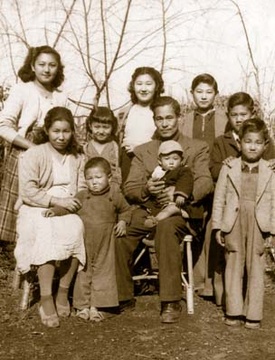
Something similar happened during the Pacific War. Nor did the majority of the people participate in the persecutions and abuses against the Japanese. What happened was planned by North American organizations and Chilean power groups, the same ones known since the beginning of the century. Both colluders colluded with a corrupt press, with a multitude of servers bought either with money or misinformation and with a Chilean police department that enthusiastically took charge of the application of the sanctions but, not out of obedience, patriotism or xenophobia but only out of the opportunity to fleece and abuse people stripped of all rights. (Hence, when choosing victims, they chose those who could extort or take their property).
On the other hand, our government authorities stubbornly maintained a level of neutrality, containing the declaration of war against Japan until almost its end (April 11, 1945). On the other hand, that popular mass that had to receive expelled and relegated people in their towns, surely, a part ignored them, but a majority gave them help and, hardly, anyone tried to attack a victimized person.
© 2016 Ariel Takeda


